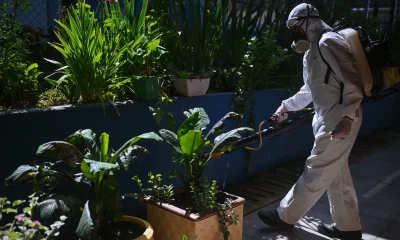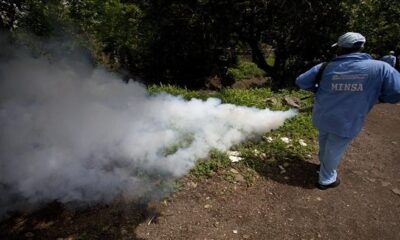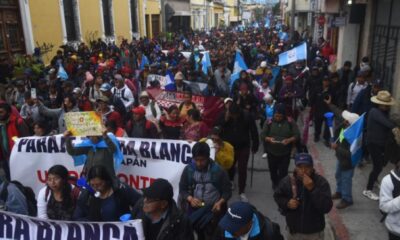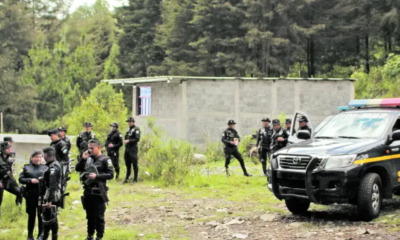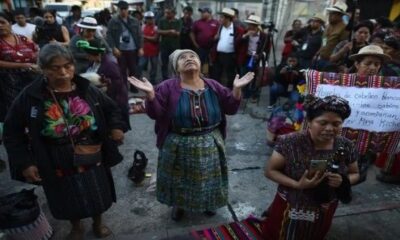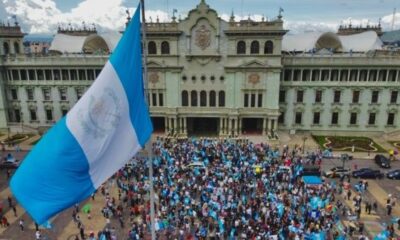Central America
Threats from the migratory route in Guatemala: dengue, arrests and climate change
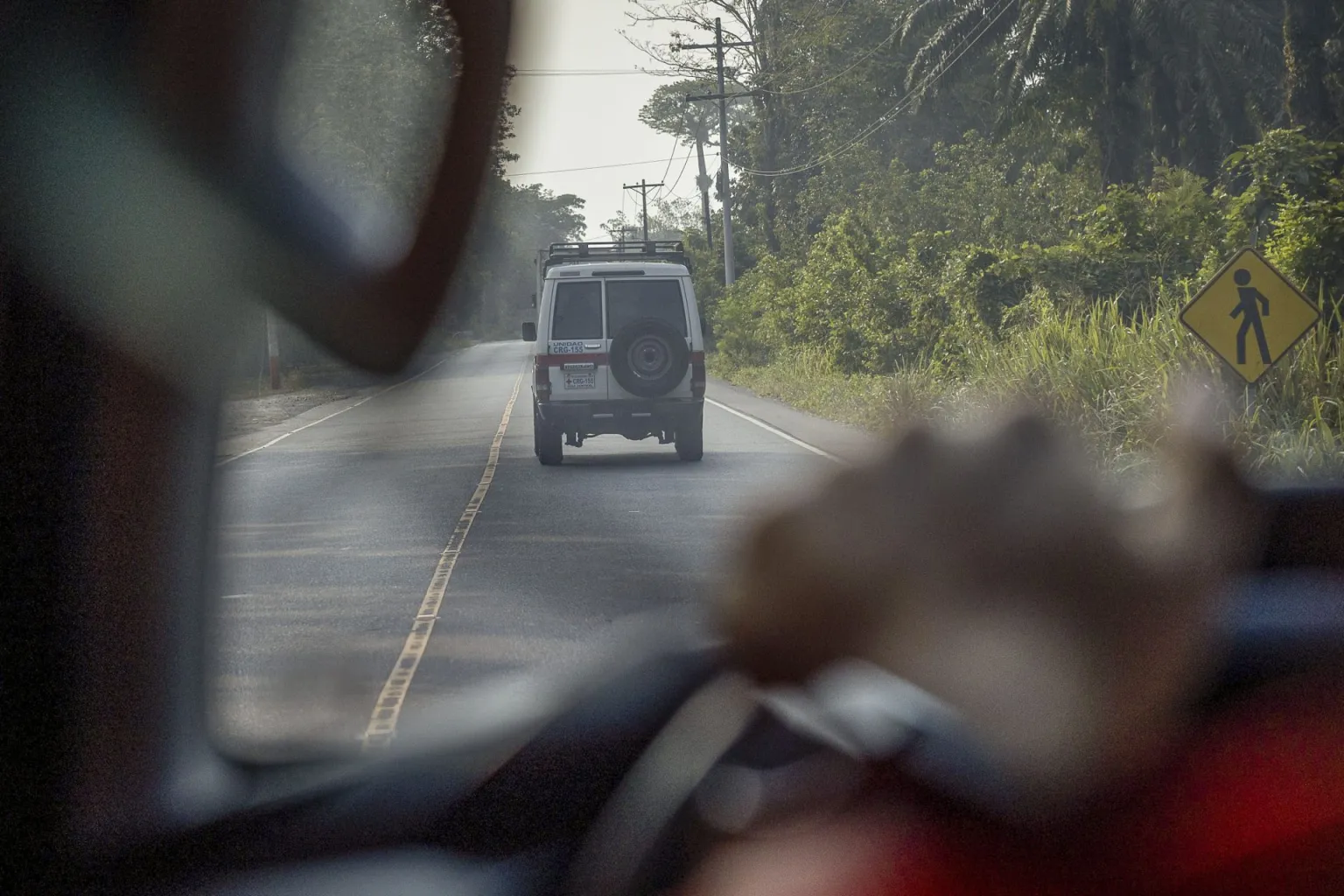
Thousands of migrants cross the border between Honduras and Guatemala daily on their way to the United States, facing the threat of tropical diseases such as dengue, the arrest of security forces and their subsequent deportation or the impact of a route hit by climate change.
On the border of El Corinto, between Guatemala and Honduras, the country’s Red Cross serves migrants who need medical assistance.
“Our job is to alleviate the suffering a little and dignify the lives of people who are in transit,” explains to EFE Mariana Bonilla, who works with the Red Cross at the Care Center for Migrants and Refugees (CAPMIR), located on the Guatemalan side of the border.
Every morning, Bonilla, 31, and the rest of her team, track the border road surrounded by African palm, banana plantations and the imposing Motagua River, the largest in Guatemala, in search of groups of migrants to guide them and indicate the points where they can receive support.
Within its center of attention, supported by the International Federation of Red Cross and Red Crescent Societies (IFRC), migrants receive both medical and psychosocial assistance. “Many come with traumas from their passage through the Darién jungle” between Colombia and Panama, explains Bonilla.
Two kilometers after crossing the border, on the migratory route, is the village of Jimeritos, a community made up of farmers dedicated mainly to the cultivation of bananas that for six years has turned its small communal room into a refuge for migrants to rest.
“We are motivated to work with migrants. They leave their countries to seek an improvement for their family and here we give them what we can, because we do not know when we will have the same need,” explains Felicita Palencia, a resident of Jimeritos who was trained by the Red Cross to take care of migrants.
The community lounge has a bedroom with capacity for 12 people and, according to the leaders of the village, there are nights where they receive up to 30 migrants who seek refuge before continuing their journey to the Mexican border of Tecún Umán, located about 540 kilometers at the other end of the country.
Community community members pay attention despite the difficulties they are going through, such as strong dengue epidemics that affect the department of Izabal, where in 2023 more than 500 cases were registered and the region was put on red alert by the health authorities, a disease from which migrants are not freed either.
On May 2, in the community room, the Red Cross gathered the children of the Jimeritos public primary school to give them a talk about hygiene and sanitation measures to eliminate the mosquito that transmits dengue, as well as tools to identify the symptoms of this disease.
Carlos Linares, who has lived in this migrant host village for 42 years, assures EFE that the biggest concern for them is climate change, since the rainy season is approaching and in years such as 2001 and 2020 many houses were destroyed by storms.
“This part of the road is the most difficult to get to the United States, because there are a lot of police and they can return us to Honduras,” Mario Alvarado, a Honduran migrant who decided to look for the “American dream,” explains to EFE.
With temperatures of 40 degrees, Alvarado crossed the border, bordering the Motagua River and the African palm plantations, to end up arrested by the Guatemalan authorities.
Alvarado is the third time he has been on his way to the United States. He does it with his compatriot Danny Gámez, the same one with whom a few months ago they were deported from Texas, United States, after a journey that allowed them to work in the North American nation as painters.
Like Alvarado and Gámez, thousands of migrants seek to cross Guatemala every year and so far in 2024 alone, almost 8,000 have been arrested by the security forces for their subsequent deportation, according to figures from the Guatemalan Migration Institute (IGM).
“It doesn’t matter how many times we are deported. If there are no conditions to live in Honduras, we will always find a way to leave again,” Alvarado reiterates, before moving away between the path of a plantation with his journey companion.
Central America
Washington Imposes Visa Ban on La Modelo Director Amid Crackdown in Nicaragua

The United States government announced Wednesday that it has imposed visa restrictions on Roberto Clemente Guevara Gómez, director of Nicaragua’s largest prison, La Modelo, for his involvement in actions that violate human rights.
In a statement, U.S. Secretary of State Marco Rubio said the measure is intended to promote accountability for abuses committed under what he described as the “Murillo-Ortega dictatorship” against political prisoners.
Rubio specified that Guevara Gómez was designated for participating in “a gross violation of the human rights of a political prisoner.” The sanction was issued under the 2024 Department of State, Foreign Operations, and Related Programs Appropriations Act, which bars the sanctioned individual — and potentially immediate family members — from entering the United States.
“United States demands the immediate and unconditional release of all political prisoners unjustly detained in Nicaragua,” the statement added.
Ongoing tensions between Washington and Managua
Washington rejected Nicaragua’s November 2021 elections, in which President Daniel Ortega and his wife, now co-president Rosario Murillo, were reelected while seven potential challengers were in prison.
Relations between the two countries remain tense amid expanding U.S. sanctions and increasing diplomatic pressure on the Nicaraguan government.
On January 10, marking Ortega’s 19 years in power, Nicaragua released “dozens of detainees,” including political prisoners. The move came one day after the U.S. Embassy in Managua stated that “more than 60 people” remain “unjustly detained or disappeared” in the Central American nation.
U.S. officials have continued to push for the “unconditional release” of political prisoners rather than selective or temporary releases.
Ortega, 80, governs alongside Murillo with consolidated authority, having strengthened executive power through constitutional reforms and security measures, while the opposition has been weakened by imprisonment, exile, and the revocation of citizenship and property rights.
Central America
Guatemala’s Attorney General Consuelo Porras Loses Bid for Constitutional Court Seat

Guatemala’s attorney general, Consuelo Porras, who has been sanctioned by the United States over corruption allegations, lost a key vote on Monday in which a public university selected two of the 10 magistrates for the country’s highest constitutional court. However, she could still seek a seat through another nominating body.
The election of five full magistrates and five alternates to the Corte de Constitucionalidad (CC) is taking place gradually over more than two months and is considered crucial in the ongoing struggle for control of Guatemala’s judiciary, which critics say has long been influenced by a political and economic elite accused of corruption.
According to results announced at a press conference, the governing council of the Universidad de San Carlos de Guatemala (USAC) rejected Porras, who had applied as either a full or alternate magistrate, and instead chose two candidates aligned with the university rector. The vote was held at a hotel in Antigua, about 35 kilometers from the capital.
Despite the setback, Porras — whose term as attorney general ends on May 16 — could still be nominated to the Constitutional Court by the Corte Suprema de Justicia, which appoints two magistrates. The remaining six are selected by the president, the bar association and Congress.
“It’s always a possibility,” the 72-year-old lawyer said days earlier when asked by reporters whether she would seek nomination through another institution if she lost the USAC vote.
Porras has been sanctioned by Washington and the European Union for allegedly attempting two years ago to block the inauguration of President Bernardo Arévalo and for pursuing legal actions against anti-corruption prosecutors, judges, journalists and social leaders since taking office in 2018.
The USAC vote was controversial because most members of the university’s governing council are serving beyond the expiration of their terms. Students, academics and social activists staged protests against Porras’ candidacy.
Central America
Teens visit ETESAL substation to learn about responsible energy use

Within the framework of World Energy Day, teenagers from the institutional care center Ciudad Niñez y Adolescencia (CNA), run by the Consejo Nacional de la Primera Infancia, Niñez y Adolescencia (Conapina), took part in an educational visit to a substation operated by Empresa Transmisora de El Salvador (ETESAL) in Santa Ana.
The aim of the activity was to give participants first-hand knowledge of how the country’s electricity transmission system works and to highlight the importance of responsible energy use.
During the tour, the group learned about the process that delivers electricity to homes, businesses, and industries. They were also introduced to specialized technical equipment and the safety measures required to ensure an efficient and reliable service.
Before the guided visit, the teenagers attended two informative talks and an environmental awareness session focused on the relevance of responsible energy consumption and its impact on the environment.
According to Nelson Menjívar, head of Conapina’s programs unit, the initiative serves a dual purpose. “It has two objectives: a recreational component and an educational one, so that adolescents can learn about the work carried out by ETESAL and how some of the resources they use at home are generated. This is in keeping with the guarantees established under the Crecer Juntos law; we ensure those rights for children,” he said.
Menjívar stressed that these activities help young people better understand how essential services function in their daily lives while promoting efficient consumption habits and a culture of environmental respect and care.
The event is part of the principle of shared responsibility set out in the Crecer Juntos law, promoted by the administration of Nayib Bukele, which states that families, society, private companies, and the State must work together to safeguard the comprehensive well-being of children and adolescents.
-

 International4 days ago
International4 days agoFamily of “El Mencho” Seeks Return of Body After Deadly Military Operation
-

 International4 days ago
International4 days agoLarry Summers Steps Down from Harvard Role Amid Epstein Controversy
-

 International4 days ago
International4 days agoIran’s President Optimistic Ahead of Geneva Nuclear Talks with U.S.
-

 International3 days ago
International3 days agoBill Gates Admits “Serious Mistake” Over Epstein Ties
-

 International4 days ago
International4 days agoStephen Hawking Photo Appears in Newly Released Epstein Documents
-

 International2 days ago
International2 days agoCocaine Production Surges 34% in 2023 as Market Expands into Africa and Asia
-

 International2 days ago
International2 days agoFederal Judge Blocks Trump Policy Allowing Deportations to Third Countries
-

 International1 day ago
International1 day agoTrump Floats “Friendly Takeover” of Cuba Amid Rising Tensions
-

 International2 days ago
International2 days agoClinton Accuses Republican Committee of Using Epstein Case to Shield Trump
-

 International1 day ago
International1 day agoArgentina’s Senate Reviews Milei-Backed Labor Overhaul
-

 International11 hours ago
International11 hours agoSecurity Council to Hold Emergency Meeting on Middle East Crisis
-

 Sin categoría11 hours ago
Sin categoría11 hours agoTrump: ‘We Think It’s True’ Amid Claims Iran’s Supreme Leader Was Killed































































